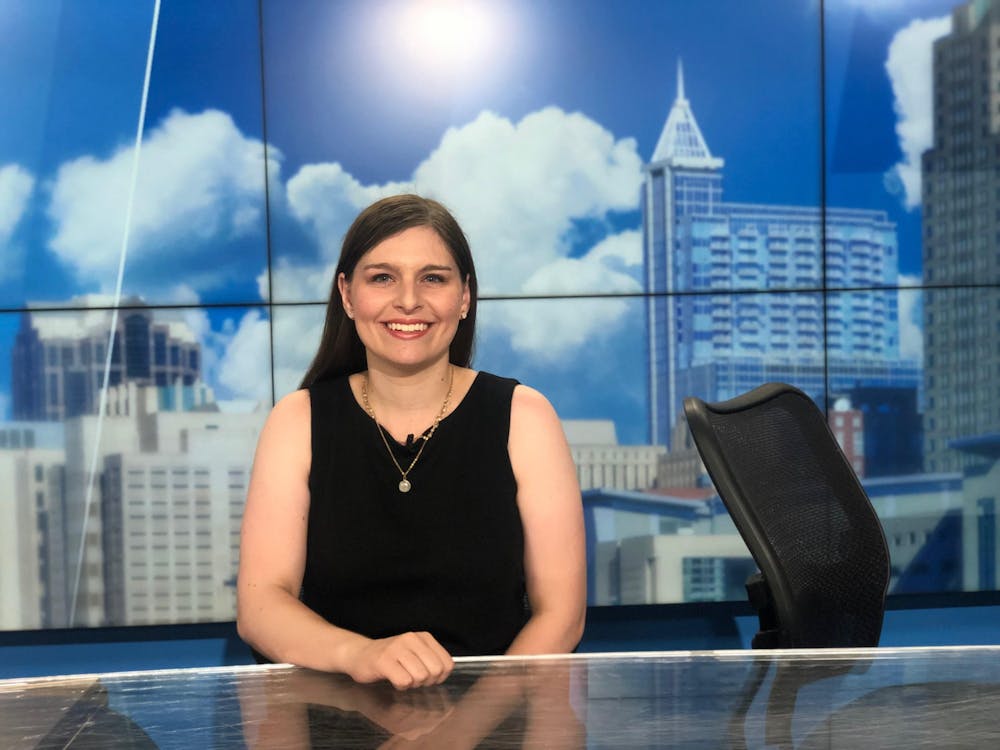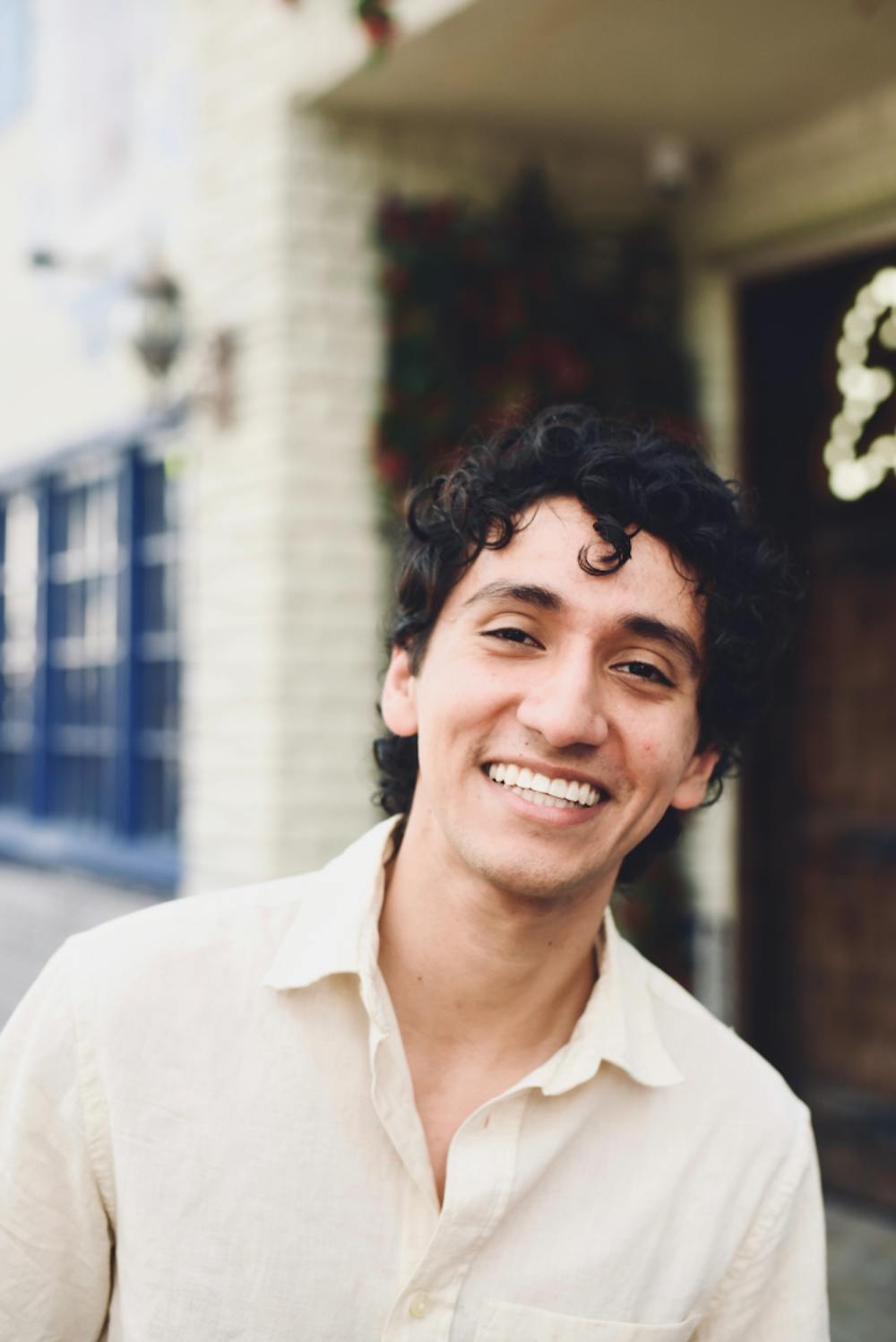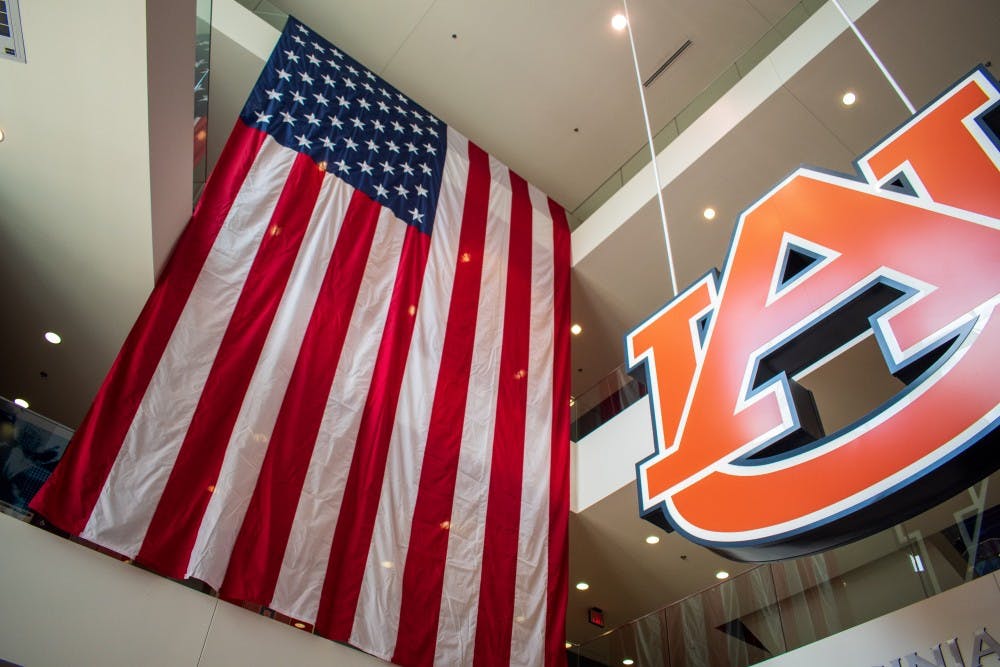The chaos streamed from a television set that September morning in the Foy Cafeteria. Students and faculty gathered with their eyes locked, their hands clasped. The area was crowded and most chairs were taken, forcing some students to the floor and some against the wall.
In photographs taken by The Plainsman on Sept. 11, 2001, the fear from that day is evident. One student pressed his hands against his face, another bit his nails.
They stared at the screen and watched the World Trade Center billow with smoke and eventually fall in flames.
The provost at the time, John Heilman, was walking into Samford when someone told him the news.
He spoke with The Plainsman about his 25-year-old daughter, Catherine, who was on her way to work in the building next to the Trade Center.
“She saw people jumping from the building, people next to her were hit with rocks and glass, and it was a very devastating moment,” Heilman told The Plainsman in 2001. “She ran for her life.”
And she survived, along with alumnus Patrick Smith, a volunteer firefighter who happened to be in New York City when the planes struck.
“The overhead shot on TV in no way portrays the actual mass that the steel and concrete make up,” he told The Plainsman in 2001.
His job was to sift silently through the rubble in order to hear a possible person buried beneath. He never found anyone.
“As America united after attacks, Auburn students watched and prayed,” read the caption in the Sept. 13 edition of The Plainsman.
In the Sept. 20 edition of The Plainsman was a story on Auburn graduate Marjorie Champion Salamone, 53, who was a budget analyst for the U.S. Army. She was one of the 125 killed when the hijacked American Airlines Flight 77 crashed into the Pentagon.
“No one in her office survived,” Richard Champion, Salamone’s brother, told The Plainsman in 2001.
Champion said his sister, who had worked at the
Pentagon for 10 years, had just moved into her new office in August 2001.
At 8:25 p.m. on Sept. 11, as Auburn and the country reeled from the terrorist attack that morning, a Plainsman photographer captured a student as he covered his eyes with his fists; someone off-frame is extending a hand and resting it on his.
Near the building where many Auburn students originally saw the terror unfold, hundreds had gathered the next day to give blood in the “Blood Mobile” stationed outside Foy. Some students waited up to four hours to do so.
“Not only was the turnout of donors unbelievable, but so was the support from the community that we received,” 2001 SGA member Amy Finley told The Plainsman.
Approximately 60 students sat crisscrossed on the concourse with their eyes closed and their heads bowed in the middle of prayer.
The next night, there was a “light wind,” there were tears and candles, according to a Plainsman reporter. It was one of many vigils that week.
“Light in our society is a sign of life. Tonight we are holding lights. There are many who have had their lights put out, but we are still here,” Auburn student Trent Wilson told a crowd on Samford Lawn on Sept. 12, 2001. “Now, more than ever, we need to make the most of that opportunity.”
The football team’s game that week against LSU was canceled by the SEC, giving the team a week to process the tragic events before heading to Syracuse, New York, to face Syracuse at a field that was only 150 miles from where the World Trade Center once stood.
The interim president at the time, William Walker, said the day was one of “national tragedy.”
Eighteen years later, that day of “national tragedy” is often not far from the minds of first responders, and that fact holds true for the Auburn departments’ first responders. Several Auburn firefighters participated in stair climbs in the days and weeks surrounding Sept. 11, said Battalion Chief Josh Datnoff.
Off-duty firefighters pay their own way to attend the stair-climb events. They don their personal protective equipment like they would wear in a house fire, sometimes wearing old steel air packs, trying to best simulate what first responders in the twin towers would have worn.
“We’re climbing to remember the firefighters, police officers and EMTs that were killed on that day,” Datnoff said. “We climb to remember the civilians that were lost.”
These firefighters make one addition — cards with names, job assignments and photos of first responders and civilians who lost their lives that September day.
At each stair climb, the participants are given one of those cards. Datnoff keeps each one and brings them to his next stair climb. After participating in over 15 climbs, he has a small collection of names and faces.
That’s who he climbs for.
“You’re not just thinking about all the people that were lost on 9/11, you’ve actually got somebody that you’re carrying up with you for that climb.”
It’s not just the people on those cards that he thinks about as he climbs. His thoughts wander to his community, which especially in the last few months has faced unprecedented events, including the loss of an Auburn police officer and 23 community members who died after at least two tornadoes struck near Beauregard, Alabama.
“When we’re climbing, most recently, we’re thinking about all the families that were affected by the tornadoes that came through Lee County,” Datnoff said. “We’re thinking about our brothers and sisters that work for the police department that have gone through a lot of difficult times in recent months.”
It’s those thoughts — of those lost on a national level 18 years ago and the recent local losses — that got Datnoff to the top of the Panama City Beach stair climb on Saturday and the last few climbs he’s done.
“It gives everybody that extra boost of energy to push through the pain of climbing those stairs,” Datnoff said. “The exhaustion pushes you through.”
The stair climbs are a way for firefighters, police officers and sometimes civilians to put themselves in the shoes of those Sept. 11 first responders and a way to remember and honor them, he said.
For former Auburn Police Chief and current City Council member Tommy Dawson, it’s also about remembering the days after Sept. 11, 2001.
The country came together in the days and months following that day because no one knew what was going to happen next, Dawson, a sergeant in the narcotics division at the time, said.
Many people were on edge because no one knew what might happen next.
Many, including Dawson, were worried they might be the next target.
Those thoughts, mixed with feelings of remembrance, united the nation, something Dawson said he truly admired because the perpetrators of the attack only unified the country.
“I was very impressed with the way everybody came together,” Dawson said. “I think they did the opposite of what they intended to do: They brought America together on 9/11.”
On Tuesday night, in Auburn Draft House, around 100 people were there to remember 9/11 in an event organized by Auburn University’s Student Veteran Association.
Kyle Venable, a former president of the Student Veterans Association and recent spring 2019 graduate, is the veterans program coordinator for the SVA.
He served in the Marines from 1994 to 2013.
Venable said it’s a bit strange to think some of the freshmen he works with in ROTC weren’t alive on 9/11.
“They may not have even been born, so all they have is what they’ve seen on TV, what they’ve heard from their parents, what they’ve read in books,” Venable said. “The best way that we can provide guidance is to preserve that history.”
Do you like this story? The Plainsman doesn't accept money from tuition or student fees, and we don't charge a subscription fee. But you can donate to support The Plainsman.

Elizabeth, senior in journalism and political science, is the community editor for The Plainsman

Eduardo Medina, senior in journalism, is the editor-in-chief of The Auburn Plainsman.





